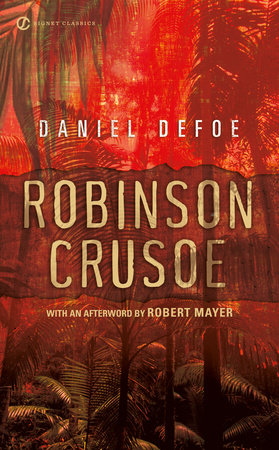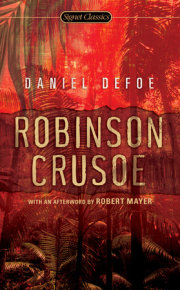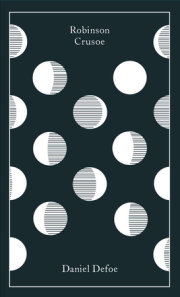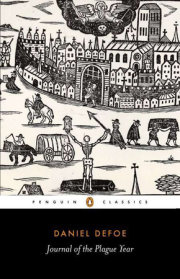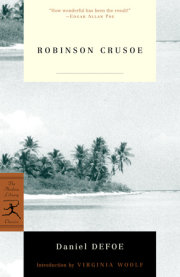I was born in the Year 1632, in the City of York, of a good Family, tho not of that Country, my Father being a Foreigner of Bremen, who settled first at Hull: He got a good Estate by Merchandise, and leaving off his Trade, lived afterward at York, from whence he had married my Mother, whose Relations were named Robinson, a very good Family in that Country, and from whom I was called Robinson Kreutznaer; but by the usual Corruption of Words in England, we are now called, nay we call our selves, and write our Name Crusoe, and so my Companions always call’d me.
I had two elder Brothers, one of which was Lieutenant Collonel to an English Regiment of Foot in Flanders, formerly commanded by the famous Coll. Lockhart, and was killed at the Battle near Dunkirk against the Spaniards: What became of my second Brother I never knew any more than my Father or Mother did know what was become of me.
Being the third Son of the Family, and not bred to any Trade, my Head began to be fill’d very early with rambling Thoughts: My Father, who was very ancient, had given me a competent Share of Learning, as far as House-Education, and a Country Free-School generally goes, and design’d me for the Law; but I would be satisfied with nothing but going to Sea, and my Inclination to this led me so strongly against the Will, nay the Commands of my Father, and against all the Entreaties and Perswasions of my Mother and other Friends, that there seem’d to be something fatal in that Propension of Nature tending directly to the Life of Misery which was to be-fal me.
My Father, a wise and grave Man, gave me serious and excellent Counsel against what he foresaw was my Design. He call’d me one Morning into his Chamber, where he was confined by the Gout, and expostulated very warmly with me upon this Subject: He ask’d me what Reasons more than a meer wandring Inclination I had for leaving my Father’s House and my native Country, where I might be well introduced, and had a Prospect of raising my Fortunes by Application and Industry, with a Life of Ease and Pleasure. He told me it was for Men of desperate Fortunes on one Hand, or of aspiring, superior Fortunes on the other, who went abroad upon Adventures, to rise by Enterprize, and make themselves famous in Undertakings of a Nature out of the common Road; that these things were all either too far above me, or too far below me; that mine was the middle State, or what might be called the upper Station of Low Life, which he had found by long Experience was the best State in the World, the most suited to human Happiness, not exposed to the Miseries and Hardships, the Labour and Sufferings of the mechanick Part of Mankind, and not embarass’d with the Pride, Luxury, Ambition and Envy of the upper Part of Mankind. He told me, I might judge of the Happiness of this State, by this one thing, viz. That this was the State of Life which all other People envied, that Kings have frequently lamented the miserable Consequences of being born to great things, and wish’d they had been placed in the Middle of the two Extremes, between the Mean and the Great; that the wise Man gave his Testimony to this as the just Standard of true Felicity, when he prayed to have neither Poverty or Riches.
He bid me observe it, and I should always find, that the Calamities of Life were shared among the upper and lower Part of Mankind; but that the middle Station had the fewest Disasters, and was not expos’d to so many Vicissitudes as the higher or lower Part of Mankind; nay, they were not subjected to so many Distempers and Uneasinesses either of Body or Mind, as those were who, by vi-cious Living, Luxury and Extravagancies on one Hand, or by hard Labour, Want of Necessaries, and mean or insufficient Diet on the other Hand, bring Distempers upon themselves by the natural Consequences of their Way of Living; That the middle Station of Life was calculated for all kind of Vertues and all kinds of Enjoyments; that Peace and Plenty were the Hand-maids of a middle Fortune; that Temperance, Moderation, Quietness, Health, Society, all agreeable Diversions, and all desirable Pleasures, were the Blessings attending the middle Station of Life; that this Way Men went silently and smoothly thro’ the World, and comfortably out of it, not embarass’d with the Labours of the Hands or of the Head, not sold to the Life of Slavery for daily Bread, or harrast with perplex’d Circumstances, which rob the Soul of Peace, and the Body of Rest; not enrag’d with the Passion of Envy, or secret burning Lust of Ambition for great things; but in easy Circumstances sliding gently thro the World, and sensibly tasting the Sweets of living, without the bitter, feeling that they are happy, and learning by every Day’s Experience to know it more sensibly.
After this, he press’d me earnestly, and in the most affectionate manner, not to play the young Man, not to precipitate my self into Miseries which Nature and the Station of Life I was born in, seem’d to have provided against; that I was under no Necessity of seeking my Bread; that he would do well for me, and endeavour to enter me fairly into the Station of Life which he had been just recommending to me; and that if I was not very easy and happy in the World, it must be my meer Fate or Fault that must hinder it, and that he should have nothing to answer for, having thus discharg’d his Duty in warning me against Measures which he knew would be to my Hurt: In a word, that as he would do very kind things for me if I would stay and settle at Home as he directed, so he would not have so much Hand in my Misfortunes, as to give me any Encouragement to go away: And to close all, he told me I had my elder Brother for an Example, to whom he had used the same earnest Perswasions to keep him from going into the Low Country Wars, but could not prevail, his young Desires prompting him to run into the Army where he was kill’d; and tho’ he said he would not cease to pray for me, yet he would venture to say to me, that if I did take this foolish Step, God would not bless me, and I would have Leisure hereafter to reflect upon having neglected his Counsel when there might be none to assist in my Recovery.
I observed in this last Part of his Discourse, which was truly Prophetick, tho’ I suppose my Father did not know it to be so himself; I say, I observed the Tears run down his Face very plentifully, and especially when he spoke of my Brother who was kill’d; and that when he spoke of my having Leisure to repent, and none to assist me, he was so mov’d, that he broke off the Discourse, and told me, his Heart was so full he could say no more to me.
I was sincerely affected with this Discourse, as indeed who could be otherwise; and I resolv’d not to think of going abroad any more, but to settle at home according to my Father’s Desire. But alas! a few Days wore it all off; and in short, to prevent any of my Father’s farther Importunities, in a few Weeks after, I resolv’d to run quite away from him. However, I did not act so hastily neither as my first Heat of Resolution prompted, but I took my Mother, at a time when I thought her a little pleasanter than ordinary, and told her, that my Thoughts were so entirely bent upon seeing the World, that I should never settle to any thing with Resolution enough to go through with it, and my Father had better give me his Consent than force me to go without it; that I was now Eighteen Years old, which was too late to go Apprentice to a Trade, or Clerk to an Attorney; that I was sure if I did, I should never serve out my time, and I should certainly run away from my Master before my Time was out, and go to Sea; and if she would speak to my Father to let me go but one Voyage abroad, if I came home again and did not like it, I would go no more, and I would promise by a double Diligence to recover that Time I had lost.
Copyright © 2001 by Daniel Defoe. All rights reserved. No part of this excerpt may be reproduced or reprinted without permission in writing from the publisher.

